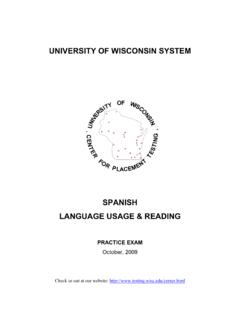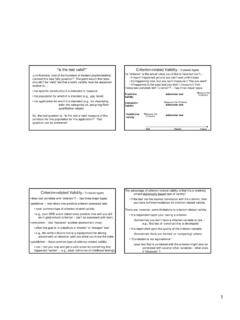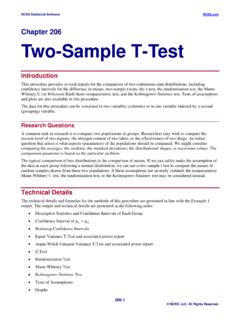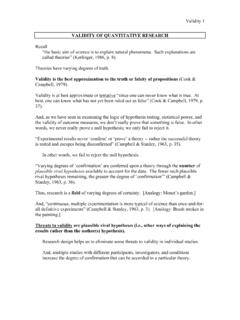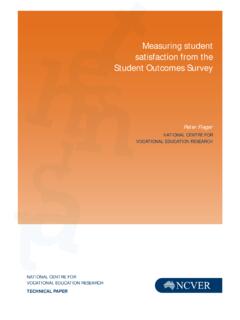Transcription of An Instructor’s Guide to Understanding Test Reliability ...
1 An Instructor s Guide to Understanding Test Reliability Craig S. Wells James A. Wollack Testing & Evaluation Services University of Wisconsin 1025 W. Johnson St., #373 Madison, WI 53706 November, 2003 2An Instructor s Guide to Understanding Test Reliability Test Reliability refers to the consistency of scores students would receive on alternate forms of the same test. Due to differences in the exact content being assessed on the alternate forms, environmental variables such as fatigue or lighting, or student error in responding, no two tests will consistently produce identical results.
2 This is true regardless of how similar the two tests are. In fact, even the same test administered to the same group of students a day later will result in two sets of scores that do not perfectly coincide. Obviously, when we administer two tests covering similar material, we prefer students scores be similar. The more comparable the scores are, the more reliable the test scores are. It is important to be concerned with a test s Reliability for two reasons. First, Reliability provides a measure of the extent to which an examinee s score reflects random measurement error.
3 Measurement errors are caused by one of three factors: (a) examinee-specific factors such as motivation, concentration, fatigue, boredom, momentary lapses of memory, carelessness in marking answers, and luck in guessing, (b) test-specific factors such as the specific set of questions selected for a test, ambiguous or tricky items, and poor directions, and (c) scoring-specific factors such as nonuniform scoring guidelines, carelessness, and counting or computational errors. These errors are random in that their effect on a student s test score is unpredictable sometimes they help students answer items correctly while other times they cause students to answer incorrectly.
4 In an unreliable test, students scores consist largely of measurement error. An unreliable test offers no advantage over randomly assigning test scores to students. 3 Therefore, it is desirable to use tests with good measures of Reliability , so as to ensure that the test scores reflect more than just random error. The second reason to be concerned with Reliability is that it is a precursor to test validity . That is, if test scores cannot be assigned consistently, it is impossible to conclude that the scores accurately measure the domain of interest. validity refers to the extent to which the inferences made from a test ( , that the student knows the material of interest or not) is justified and accurate.
5 Ultimately, validity is the psychometric property about which we are most concerned. However, formally assessing the validity of a specific use of a test can be a laborious and time-consuming process. Therefore, Reliability analysis is often viewed as a first-step in the test validation process. If the test is unreliable, one needn t spend the time investigating whether it is valid it will not be. If the test has adequate Reliability , however, then a validation study would be worthwhile. There are several ways to collect Reliability data, many of which depend on the exact nature of the measurement.
6 This paper will address Reliability for teacher-made exams consisting of multiple-choice items that are scored as either correct or incorrect. Other types of Reliability analyses will be discussed in future papers. The most common scenario for classroom exams involves administering one test to all students at one time point. Methods used to estimate Reliability under this circumstance are referred to as measures of internal consistency. In this case, a single score is used to indicate a student s level of Understanding on a particular topic. However, the purpose of the exam is not simply to determine how many items students answered correctly on a particular test, but to measure how well they know the content area.
7 To achieve this goal, the particular items on the test must be sampled in a way as to be representative of the entire domain of interest. It is expected that students mastering 4the domain will perform well and those who have not mastered the domain will perform less well, regardless of the particular sample of items used on the exam. Furthermore, because all items on that test tap some aspect of a common domain of interest, it is expected that students will perform similarly across different items within the test. Reliability Coefficient for Internal Consistency There are several statistical indexes that may be used to measure the amount of internal consistency for an exam.
8 The most popular index (and the one reported in Testing & Evaluation s item analysis) is referred to as Cronbach s alpha. Cronbach s alpha provides a measure of the extent to which the items on a test, each of which could be thought of as a mini-test, provide consistent information with regard to students mastery of the domain. In this way, Cronbach s alpha is often considered a measure of item homogeneity; , large alpha values indicate that the items are tapping a common domain. The formula for Cronbach s alpha is as follows: 12(1) 1 1kiiiXppkk= =.
9 K is the number of items on the exam; pi, referred to as the item difficulty, is the proportion of examinees who answered item i correctly; and 2 X is the sample variance for the total score. To illustrate, suppose that a five-item multiple-choice exam was administered with the following percentages of correct response: p1 = .4, p2 = .5, p3 = .6, p4 = .75, p5 = .85, and 2 =. Cronbach s alpha would be calculated as follows: = = . 5 Cronbach s alpha ranges from 0 to , with values close to indicating high consistency. Professionally developed high-stakes standardized tests should have internal consistency coefficients of at least.
10 90. Lower-stakes standardized tests should have internal consistencies of at least .80 or .85. For a classroom exam, it is desirable to have a Reliability coefficient of .70 or higher. High Reliability coefficients are required for standardized tests because they are administered only once and the score on that one test is used to draw conclusions about each student s level on the trait of interest. It is acceptable for classroom exams to have lower reliabilities because a student s score on any one exam does not constitute that student s entire grade in the course.




